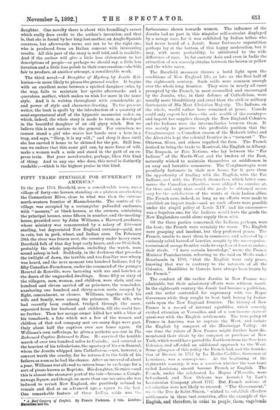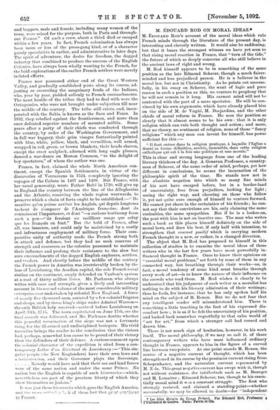FIFTY YEARS' STRUGGLE FOR SUPREMACY IN AMERICA.*
IN the year 1704, Deerfield, now a considerable town, was a village of forty-one houses, standing on a plateau overlooking
the Connecticut River, close to what was then the extreme north-western frontier of Massachusetts. The centre of the village was occupied by a rectangular palisaded enclosure, with " mounts," or block-houses, at the corners, containing the principal houses, some fifteen in number, and the meeting- house, presided over by John Williams, a Harvard graduate, whose ministry was remunerated by a salary of £00—not sterling, but depreciated New England currency—paid, not in coin, but in pork, wheat, and Indian corn. On February 28th the river was frozen over, the country under heavy snow. Deerfield folk of that day kept early hours, and ere 10 o'clock, probably the whole population, including the watch, were sound asleep in bed. Suddenly, in the darkness that precedes the twilight of dawn, the terrible and too-familiar war-whoop was heard, and the next moment two hundred Indians, led by fifty Canadian-Frenchmen, under the command of the younger Heurtel de Rouville, were battering with axe and hatchet at the doors of the unguarded dwellings. Some fifty or sixty of the villagers, men, women, and children, were slain, and one hundred and eleven carried off as prisoners, the remainder, numbering one hundred and thirty-seven souls. escaped by flight, concealment, or chance. Williams, together with his wife and family, were among the prisoners. His wife, who had recently been confined, trudged through the snow, separated from her husband and children, till she could fare no further. Then her savage owner killed her with a blow of his tomahawk, a fate which not a few of the women and children of that sad company met ere many days were past. Only about half the captives ever saw home again. Of Williams's own sufferings, he gives a pathetic account in The Redeemed Captive Returned to Zion. He survived the terrible march of over two hundred miles to Canada; and counted as the heaviest of his tribulations, the apostasy of his son Samuel, whom the Jesuits whipped into Catholicism,—not, however, a convert worth the cruelty, for be returned to the faith of his fathers as soon as he had the chance. After an interval of about a year, Williams was allowed to return home in exchange for a sort of pirate known as Baptiste. His daughter, Gernice—and this is almost the strangest part of the tale—became a Caugh- nawaga Squaw, and though on more than one occasion she was induced to revisit New England, she positively refused to remain and died at an advanced age, a squaw to the last, One remarkable feature of these India:, raids was the
• d Half Century of CONlhot, By Film* rack ate,g ,914, London, and Os.
forbearance shown towards women. The influence of the Jesuits had no part in this singular self-restraint displayed
by a savage race, for it was exhibited by Indian tribes who had never heard of a Jesuit. Some fortunate superstition perhaps lay at the bottom of this happy moderation, but it may, with more probability, be attributed to the wide difference of race. In far eastern Asia and even in India the attraction of sex scarcely obtains between the brown or yellow and the white races.
The Deerfield massacre throws a lurid light upon the conditions of New England life, as late as the first half of the eighteenth century. Such raids were common enough over the whole long frontier. They were in nearly all cases prompted by the French, in most counselled and encouraged by the Jesuits, who, in their defence of Catholicism, were usually more bloodthirsty and cruel than the civil or military lieutenants of His Most Christian Majesty. The Indians, on the whole, would rather have remained at peace. Canada could only export her furs—the sole wealth of the country— and import her supplies through the New England Colonies, and the Indians were the intermediaries between them. It was mainly to preserve this profitable position that the Cauglinawagas (a Canadian swarm of the Mohawk tribe) and the Abenakis kept the colonial frontier in a "torment." The Ottawas, Sioux, and others supplied the furs. The French desired to bring the trade to Montreal, the English to Albany. The Iroquois, or Five Nations, who lay between the " Far Indians" of the North-West and the tenders of the East, naturally wished to maintain themselves as middlemen in an easy and lucrative commerce. The Caughuawagas were peculiarly fortunate in their new home, for it gave them the opportunity of trading with the English, with the Far Indians, and with the French themselves, which latter com- merce the Canadian authorities were obliged to connive at, for thus, and only thus could the goods be obtained neces- sary for the satisfaction of the wants of their Indian allies. The French case, indeed, as long as no efforts were made to establish an import trade—and no such efforts were possible under the stupid policy of Louis XIV. and his successor— was a hopeless one, for the Indians would have the goods the New Englanders could alone supply them with.
Of the three parties concerned, the Indians, perhaps, were the best ; the French were certainly the worst. The English were grasping and insolent, but they preferred peace. The French, unable to meet them in commerce, and actuated by a curiously rabid hatred of heretics, sought by the unserupuloti terrorism of savage frontier raids to expel, or at least to isolate, their rivals. " I have certain knowledge," wrote the French Minister Pontchartrain, referring to the raid on Wells undo r Beaubassin in 1703, "that the English want only peace, knowing that war is contrary to the interests of all the Colonies. Hostilities in Canada have always been begun by the French."
The conduct of the earlier Jesuits in New France was admirable, but their missionary efforts were without result. In the eighteenth century the Jesuit had become a politician, and the order contended for supremacy with the Royal Governors while they sought to beat back heresy by Indian raids upon the New England frontier. I'he history of New France is a record of internal squabbles, which scarcely
excited attention at Versailles, and of a continuous state of quasi-war with the English settlements. The true policy of France in America was to capture the West, and isolate
the English by conquest of the Mississippi Valley. At
one time the rulers of New France might further have dis- membered their rivals by the conquest or purchase of New York, which would have parted the Northern irons the Sou' hear
Colonies, and afforded an additional approach to the West.
Some glimpses of this policy the French had, and the founda- tion of Detroit in 1712 by La Mothe-Cadillau, Governor of Louisiana. was a consequence!. At the beginning of the eighteenth century, it was a question whether the vast, tract called Louisiana should become French or English. The
Ft ouch, under the celebrated Le Moyne d'Herville, were beforehand, and New Orleans was founded by Law's Louisianian Company about 1717. But French notions of eel were not likely to succeed. " The Government,"
the Due de Saint,Simon, " wished to establish effective settleuieutti in these vast countries, after the example of the English, and therefore, iu order to reople, them, vagaboudi
and beggars, male and female, including many women of the town, were seized for the purpose, both in Paris and through- out France." Of such a crew, about a third died or escaped within a few years. In fact, French colonisation has always been more or less of the press-gang kind, or of a character purely speculative in earlier, and administrative in later days. The spirit of adventure, the desire for freedom, the dogged industry that combined to produce the success of the English Colonies, have always been wholly wanting to the French, for the bold explorations of the earlier French settlers were merely isolated efforts.
France now possessed either end of the Great Western Valley, and gradually established posts along its course, ad- justing or overruling the sanguinary feuds of the Indians, who, year by year, yielded sullenly to French encroachments. The most hostile of the tribes they had to deal with were the Outagamies, who were not brought under subjection till near the middle of the century. The tribe still exists, and, incor- porated with the Sakis, is known as the Sacs and Foxes. In 1832, they rebelled against the frontiersmen, and more than once defeated superior numbers of mounted militia. Some years after a party of their chiefs was conducted through the country, by order of the Washington Government, and in full war toggery, their grim visages fantastically painted with blue, white, yellow, black, and vermillion, well armed, wrapped in red, green, or brown blankets, their heads shaven, except the erect sca1plock, adorned with long eagle plumes, danced a war-dance on Boston Common, " to the delight of boy spectators," of whom the author was one.
France, in fact, claimed the whole North American con- tinent, except the Spanish Settlements, in virtue of the discoveries of Verrazzano in 1524, completely ignoring the voyages of the Cabots in 1497 and 1498. But France, with her usual generosity, wrote Father Bobe in 1720, will give up to England the country between the line of the Alleghanies and the Atlantic, reserving the whole region westwards, to preserve which a chain of forts ought to be established :—" De maniere qu'on pnisse arreter les Anglois, qui depuis longtems tachent de s'emparer de l'Amerique francoise, dont Ils connoissent l'importance, et dont "—a curious testimony from such a pen—"ils feroient un meillieur usage que celuy que les frangois en font." But the hold of France, after all, was insecure, and could only be maintained by a costly and infructuous employment of military force. Their com- parative unity of authority made the French strong both in attack and defence, but they had no such reserves of strength and resources as the colonies possessed to maintain their influence and prolong their resistance to the slow but sure encroachments of the dogged English explorers, settlers, and traders. And shortly before the middle of the century the French power in America was irretrievably broken by the loss of Louisbourg, the Acadian capital, the sole French naval station on the continent, amply defended on Vauban's system at a cost of thirty million livres. Mr. Parkman, who always writes with ease and strength, gives a lively and interesting account in his second volume of the most considerable military enterprise ever undertaken by colonial New Eugland. A force of nearly five thousand men, assisted by a few colonial frigates and sloops, and by three king's ships under Admiral Warren— the only British help received—arrived before Louisbourg on April :10th, 1745. The town capitulated on June 17th, ere the final assault was delivered, and Mr. Parkman doubts whether this peaceful termination of the siege was not a fortunate thing for the ill-armed and undisciplined besiegers. His vivid narrative brings the reader to the conclusion that the victors had, perhaps, somewhat less cause to be proud of their victory than the defenders of their defence. A curious comment upon the colonial character of the expedition is cited from a con- temporary Lettre d'un Habitant de Louisbourg :—.` This sin- gular people (the New Englanders) have their own laws and alulinistration, and their Governor plays the Sovereign.
Nobody would have said that their sea and land forces were of the same nation and under the same Prince. No nation but the English is capable of such bizarreries—which, nevertheless, are part of the precious liberty of which they show themselves so jealous."
It, was just these bizererries which gave the English America, and t1e nuns nrthn?::g!,: of them lost that gr-at un'ineut to Frauve.























































 Previous page
Previous page